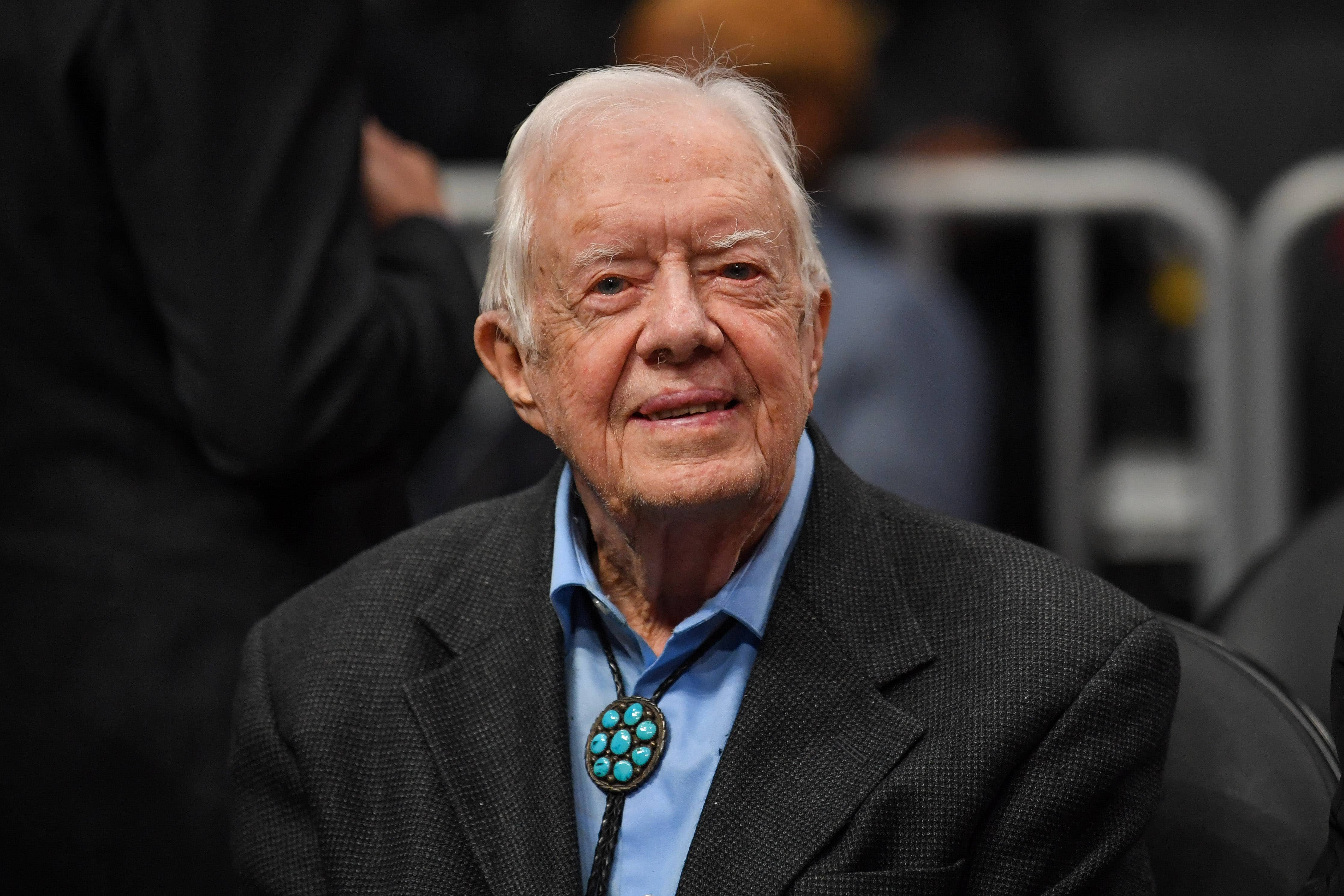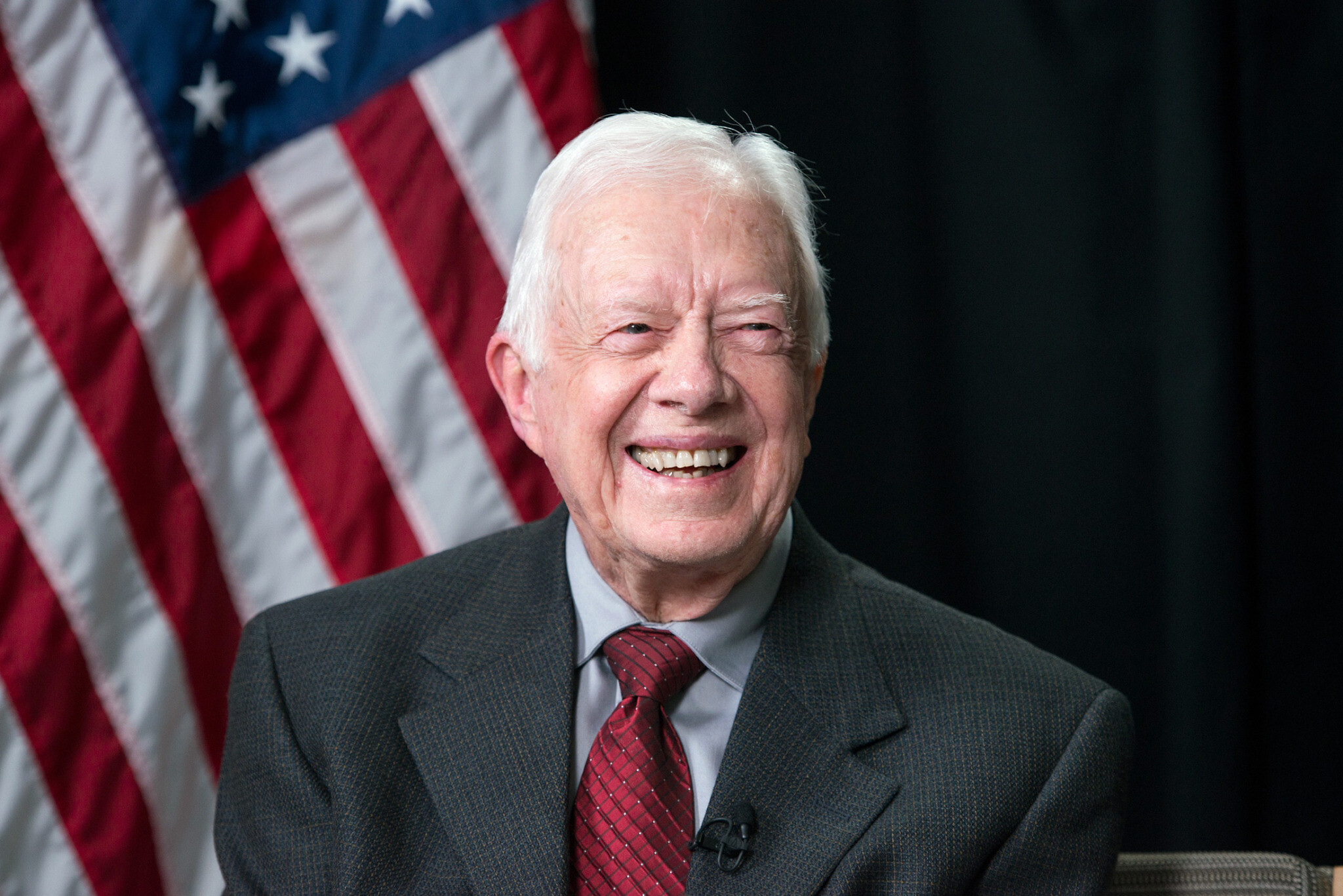Jimmy Carter’s Early Life and Education
Jimmy carter – James Earl “Jimmy” Carter Jr. was born on October 1, 1924, in Plains, Georgia. He was the eldest of four children born to James Earl Carter Sr. and Bessie Lillian Gordy Carter. His father was a farmer and businessman, while his mother was a registered nurse.
Former President Jimmy Carter is known for his work on human rights and peace initiatives. Carter has also been involved in the entertainment industry, appearing in a cameo role in the long legs movie. The film is a comedy about a group of friends who go on a road trip to find a lost dog.
Carter’s appearance in the film is brief, but it is a reminder of his versatility and his willingness to try new things.
Carter’s early life was shaped by the values of his family, which emphasized hard work, honesty, and compassion. He attended public schools in Plains and graduated from high school in 1941. After graduating from high school, Carter attended Georgia Southwestern College for two years before transferring to the United States Naval Academy in Annapolis, Maryland. He graduated from the Naval Academy in 1946 and served in the Navy for seven years.
Jimmy Carter, the 39th president of the United States, played a significant role in international diplomacy. His mediation efforts in the conflict between chile vs peru in the 1980s helped to resolve the territorial dispute and bring about a peaceful resolution.
Carter’s commitment to peace and his ability to facilitate dialogue between opposing parties were instrumental in finding a diplomatic solution to this complex and long-standing conflict.
After leaving the Navy, Carter returned to Georgia and worked as a peanut farmer. He also became involved in local politics and was elected to the Georgia State Senate in 1962. In 1970, he was elected Governor of Georgia.
Jimmy Carter, the 39th president of the United States, is known for his work on human rights and peace. In 1978, he brokered the Camp David Accords, which led to a peace treaty between Israel and Egypt. Carter’s commitment to diplomacy and peacemaking is reflected in his support for pepe portugal , a human rights activist who has worked to promote peace and reconciliation in conflict zones around the world.
Carter’s legacy as a peacemaker continues to inspire those who work to resolve conflict and build a more just and peaceful world.
Family Background
Carter’s family had a strong influence on his early life. His father was a successful farmer and businessman, while his mother was a registered nurse. Carter’s parents instilled in him the values of hard work, honesty, and compassion. These values would later shape his career in politics and public service.
Jimmy Carter, the 39th President of the United States, was known for his humanitarian efforts and his work to promote peace. In a nosferatu spongebob gif , Carter is depicted as a vampire, complete with fangs and a cape. This gif is a playful take on Carter’s image, and it highlights his dedication to fighting for the rights of others.
Education
Carter attended public schools in Plains, Georgia, and graduated from high school in 1941. After graduating from high school, Carter attended Georgia Southwestern College for two years before transferring to the United States Naval Academy in Annapolis, Maryland. He graduated from the Naval Academy in 1946 and served in the Navy for seven years.
Early Career, Jimmy carter
After leaving the Navy, Carter returned to Georgia and worked as a peanut farmer. He also became involved in local politics and was elected to the Georgia State Senate in 1962. In 1970, he was elected Governor of Georgia.
Jimmy Carter, a man of faith and resilience, found solace in cycling during his presidency. As he pedaled through the scenic trails, his thoughts wandered to the iconic photographs of the bikeriders , capturing the spirit of freedom and adventure.
Carter’s passion for cycling mirrored his unwavering belief in the human spirit, a testament to his character and the transformative power of human endeavor.
Factors Contributing to His Interest in Politics and Public Service
Several factors contributed to Carter’s interest in politics and public service. First, his family had a long history of involvement in politics. His father was a member of the Georgia House of Representatives, and his grandfather was a mayor of Plains. Second, Carter was influenced by the civil rights movement. He was deeply moved by the struggle for racial equality, and he believed that he could make a difference in the world by working to improve the lives of others.
Jimmy Carter’s Political Career

Jimmy Carter’s political career began in 1962 when he was elected to the Georgia State Senate. He served two terms in the Senate before being elected Governor of Georgia in 1970. As Governor, Carter implemented a number of progressive policies, including the creation of a state income tax, the expansion of Medicaid, and the desegregation of Georgia’s public schools. He also played a key role in the passage of the Voting Rights Act of 1965.
In 1976, Carter was elected President of the United States. He defeated incumbent President Gerald Ford in a close election. Carter’s presidency was marked by a number of challenges, including the Iran hostage crisis, the energy crisis, and the Cold War. Despite these challenges, Carter achieved a number of significant accomplishments, including the signing of the Camp David Accords, the creation of the Department of Energy, and the passage of the Panama Canal Treaty.
Carter’s Political Accomplishments
As Governor of Georgia, Carter implemented a number of progressive policies that had a lasting impact on the state. These policies included:
- The creation of a state income tax, which helped to fund education and other essential services.
- The expansion of Medicaid, which provided health insurance to low-income Georgians.
- The desegregation of Georgia’s public schools, which was a major step forward in the fight for civil rights.
As President of the United States, Carter achieved a number of significant accomplishments, including:
- The signing of the Camp David Accords, which helped to bring peace between Israel and Egypt.
- The creation of the Department of Energy, which was responsible for developing and implementing the nation’s energy policy.
- The passage of the Panama Canal Treaty, which transferred control of the Panama Canal from the United States to Panama.
Carter’s presidency was also marked by a number of challenges, including:
- The Iran hostage crisis, which began when Iranian militants seized the U.S. embassy in Tehran and took American hostages.
- The energy crisis, which was caused by a combination of factors, including the OPEC oil embargo and the increasing demand for oil.
- The Cold War, which was a period of tension between the United States and the Soviet Union.
Despite these challenges, Carter was able to achieve a number of significant accomplishments during his presidency. He left office in 1981 with a legacy of progressive policies and a commitment to peace and human rights.
Jimmy Carter’s Legacy and Impact

Jimmy Carter’s presidency left a lasting impact on both domestic and foreign policy. His commitment to human rights and social justice shaped his approach to governing, both domestically and internationally.
In domestic policy, Carter is credited with deregulating the airline, trucking, and railroad industries, which led to increased competition and lower prices for consumers. He also established the Department of Energy and appointed the first woman to the Supreme Court, Sandra Day O’Connor.
Foreign Policy
In foreign policy, Carter is best known for his efforts to negotiate the Camp David Accords between Israel and Egypt, which led to a peace treaty between the two countries. He also played a key role in the Panama Canal Treaty, which transferred control of the canal from the United States to Panama.
Carter’s presidency was also marked by the Iran hostage crisis, in which Iranian militants seized the U.S. embassy in Tehran and held American hostages for 444 days. Carter’s handling of the crisis was widely criticized, and it contributed to his defeat in the 1980 presidential election.
Post-Presidency
After leaving office, Carter founded the Carter Center, a non-profit organization that works to promote peace and democracy around the world. He has also been a vocal advocate for human rights and has worked to resolve conflicts in countries such as Sudan, North Korea, and Haiti.
Jimmy Carter is a complex and controversial figure, but there is no doubt that he has left a lasting legacy on the United States and the world.